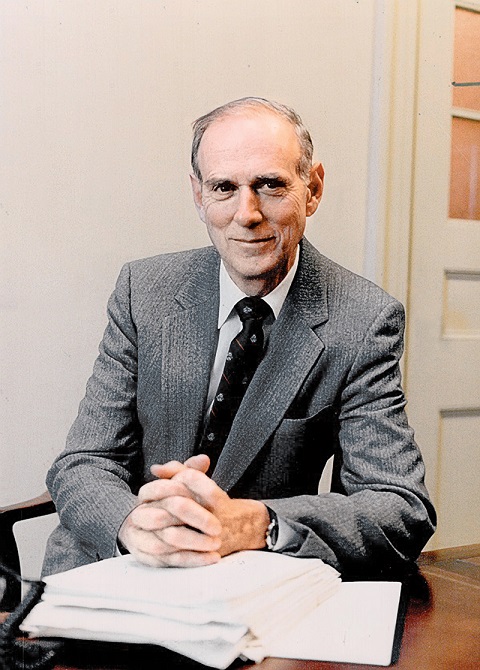Great Scientists are rational thinkers, capable of spending long hours alone in the service of great goals. George Connell, who passed away on March 13, was no exception. A profoundly generous and fair leader, he was more than up to the social demands of his job as U of T’s 12th president. Yet he is best remembered for a project he worked on in virtual solitude.
In Renewal 1987 – a discussion paper that took 10 months to write, following an intense period of community consultation – Connell charted a course for U of T that would vault it into the top ranks of world institutions. His wide-ranging recommendations continue to influence his successors today. Says David Naylor of his own presidency (2005–2013): “Every time I turned around, there would be an issue that George Connell had already addressed in Renewal 1987. He laid the foundations on which the university will continue to build for generations.”
Connell’s sterling achievement was to recognize the importance of a strong endowment. Under his watch, the Breakthrough campaign was started – a $126-million fundraising effort that enabled U of T to scale (in Connell’s words) the “Pinnacle of Parnassus.”
Connell was born in Saskatchewan in 1930. The son of two dentists, he followed their lead in attending U of T (BA 1951 Trinity, PhD 1955), from which he eventually obtained a doctorate in biochemistry. As a professor in the department, he gained renown for his study of cholinesterase, an enzyme that governs how anesthetics are metabolized.
![Dr. George Connell when he was chair of U of T’s biochemistry department, 1966. Photo: Courtesy U of T Archives B1998-0033/009P [721012-1]](/wp-content/uploads/2015/06/George_Connell_Chair_480_480.jpg)
His chairmanship of that department revealed a distinct flair for administration, leading to an appointment as president of the University of Western Ontario in 1977. He so enjoyed his time there that he first resisted the opportunity to govern U of T some seven years later. Out of duty to his alma mater he accepted; and it was, as Naylor says, “a fantastic presidency. He was only here six years, but he did wonders.”
After leaving in 1990, Connell acted as principal adviser to the Krever Inquiry into Canada’s blood system, and to the contaminated water inquiry in Walkerton, Ontario. He also helped to shape public policy across the country, both as a member of the Fisher Commission on the future of Ontario’s universities, and as a trustee of the McLaughlin Foundation. In the latter capacity, he helped guide grants to numerous institutions, improved post-graduate training opportunities for academic research clinicians and advanced the development of molecular medicine in Canada.
A low-key man who avoided the spotlight, George Connell nonetheless demonstrated the best qualities of leadership. Meg Connell (MBA 1991) is the youngest of his four children with wife Sheila (BA 1953 Trinity) and now works as Director, Office of the Dean at U of T’s Faculty of Medicine. She says: “In the outpouring of cards, letters and emails that came after he died, I was struck by the personal impact he had on people. It really brought home that he wasn’t just an amazing dad: he was a great figure, who did some really great things.”






